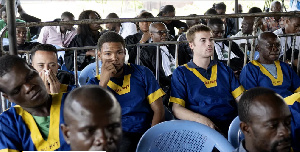- Home - News
- Polls
- Year In Review
- News Archive
- Crime & Punishment
- Politics
- Regional
- Editorial
- Health
- Ghanaians Abroad
- Tabloid
- Africa
- Religion
- Election 2020
- Coronavirus
- Photo Archives
- News Headlines
- Press Release
Press Releases of Thursday, 17 June 2021
Source: Eco Amet Solutions
The magic of biogas, the power of aid-free business
Head to head with development aid to developing biogas markets in Africa
A set of small biogas digesters, biogas backpacks and biogas stoves replace firewood and charcoal for cooking. The technology and the approach of (B)energy prove that a smart business model implemented by local entrepreneurs is much more effective than aid projects funded by western donors. But foreign aid makes business difficult in Africa.
Cooking in Africa is expensive! It is not the food but the energy used for cooking that has become a major expense for African households south of the Sahara. While still, about 80 per cent of the households in Sub-Saharan Africa cook with traditional fuels, thus firewood or charcoal on more or less open fires, this practice consumes up to half of the households’ incomes.
These fuels significantly contribute to greenhouse gas emissions, deforestation, soil erosion, loss of soil fertility and lead to severe indoor air pollution with the premature death of about 4 million people worldwide – annually.
Biogas is probably the cleanest and most sustainable alternative cooking fuel used, but its acceptance and dissemination are progressing only very slowly in Africa. But why?
One strategy that has been pursued in several countries is to distribute free or subsidized biogas systems among the population. In Ethiopia alone, over 25.000 household biogas plants have been built in the past 10 years with over 50 million Euros from European taxpayers.
A program that originally had one major aim: private sector development. Until today the private sector is basically non-existent. No company, including (B)energy, has competed with the heavily subsidized biogas digesters promoted by the Program.
Consequently, biogas technology is not freely available on the market but only for households that qualify for the subsidy. This is one example of many on the continent. In some countries, donors and international organizations compete for participants and beneficiaries while by-passing local governments; there are no activities around biogas at all in other countries.
In general, the few companies in the sector use every chance to take donations or external funding to extend and survive their “businesses” because the markets are unregulated, there are no rules, no coordination and entrepreneurs are completely unprotected.
The consequence of this: there is literally no biogas system on the market that is not somehow subsidized. The amount of subsidy determines the price for the user, and the competitors’ success is thus determined by the most successful fundraiser – not an innovator. In the end, the market is so heavily distorted that nobody will exist in the long term – at the cost of the local population.
When aid organizations or aid money gets involved in biogas dissemination, then the whole biogas sector is put at risk in 3 significant ways:
The reputation of biogas technology is damaged. We often meet people who know biogas as something that is “very expensive and does not work” because of a lack of ownership for free products and missing service.
It reduces the willingness of customers to pay for a biogas system and increases jealousy – if some people get a free or subsidized system, everybody else expects the same or feels mistreated.
Private sector development is not possible when entrepreneurs have to compete with aid-funded projects or companies. This risk is simply too big for entrepreneurs as there are no competition laws in place that could protect them.
(B)energy does things differently – independent and aid free:
(B)energy gives its partners three promises:
No use of aid money to prevent market distortion.
No participation in donor-funded biogas projects to prevent reputational damage of biogas through failed projects.
Protection from market-distorting activities of international organization as far as in our power.
More and more people know about these adverse effects of foreign responsibility-taking for local issues. All partners of (B)energy work on setting a tangible example of how it can be done differently.
By following a fundamentally different approach where the social business rules of Muhammad Yunus are taken very seriously and especially the rule of “economic and financial independence” are implemented strictly: 100% exclusion of Western funding, this means no aid money, no donations, no investment incentives.
This leads to mainly local (African) investments that are not interfered with by aid organizations that provide the same product. The aim is to protect the market and those entrepreneurs who take responsibility in their own countries for their people and a better life.
Getting started with biogas as business
To get started is easy: interested business partners participate in a biogas business training where they learn everything about biogas science and technology, practical installation, maintenance and the business frame provided.
It includes technical solutions and software solutions, legal advice, technical support, import/export support, innovations and licenses, network access and much more. Once the new distributor has started to make the biogas system available on the market in her/his country, independent installers can join.
Installers are usually young, active, practical people from all parts of the country, especially from rural areas, who use the chance to build their own biogas installer business. Through online training and the (B)app installers get trained and guided in setting up their installer venture.
They are also the ones who promote the technology in their surroundings. Their customers, this means the end customers of the biogas systems themselves become entrepreneurs. While producing biogas from organic waste and animal manure, they are introduced to the idea of selling biogas in the biogas backpack.
Biogas serves as a substitute for firewood and charcoal as the combination of the biogas backpack with the modular biogas burner allows neighbouring households to switch their cooking fuel comfortably.












